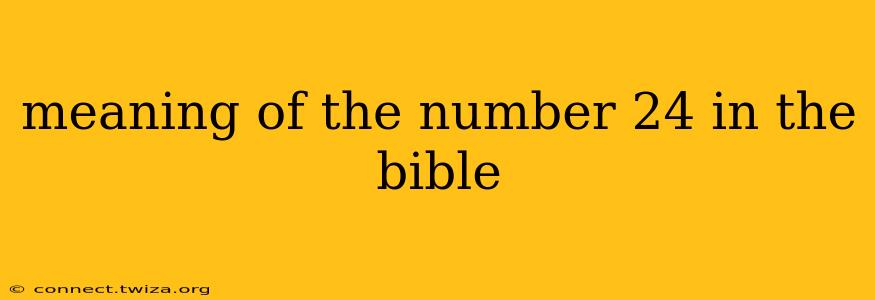The number 24 holds significant symbolic weight in the Bible, appearing repeatedly and often in contexts related to God's completeness, divine governance, and the church. Unlike some numbers with single, universally accepted meanings, the significance of 24 emerges from its constituent parts and the contexts in which it appears. Understanding its meaning requires examining its mathematical components and the biblical passages where it features prominently.
Why is 24 significant in the Bible?
The number 24 is often interpreted as a representation of completeness or wholeness. This stems from its derivation: 12 (representing the tribes of Israel or the apostles) multiplied by 2 (symbolizing a double portion or spiritual fulfillment). This interpretation emphasizes the idea of a comprehensive, complete representation of God's people or His authority.
The Elders Around the Throne (Revelation 4:4)
One of the most striking appearances of the number 24 is in Revelation 4:4, describing the twenty-four elders surrounding God's throne. This scene depicts the heavenly assembly, representing the complete church triumphant, united in worship and service to God. Each elder is seen as a symbol of the redeemed, highlighting the ultimate fulfillment of God's plan for His people. The image of 24 elders suggests a perfect representation of those who have achieved salvation, demonstrating God's comprehensive and complete work of redemption.
The 24 Courses of Priests (1 Chronicles 24)
1 Chronicles 24 details the 24 courses of priests appointed by David to serve in the temple. This organization ensured continuous worship and service to God. The division into 24 groups provided an efficient and sustainable system for maintaining the temple's sacred duties. This meticulous arrangement underscores the importance of organized, diligent service to God, illustrating a commitment to consistent and comprehensive worship.
Frequently Asked Questions (FAQs)
Many people have similar questions about the number 24's significance. Let's address some of the most common ones:
What does the number 24 symbolize in the Bible besides completeness?
While completeness is a central theme, the number 24 can also symbolize divine order and governance. The 24 courses of priests illustrate this, showing God's meticulous planning for His worship and His people's service. The presence of 24 elders also reinforces the idea of God's sovereign rule and the perfect harmony of His kingdom.
Is 24 always symbolic in the Bible, or can it sometimes be just a numerical detail?
While it's often used symbolically, there are instances where 24 might simply represent a number of people, items, or days without a deeper symbolic implication. However, given its recurring appearance in contexts with clear spiritual meaning, it is important to consider its symbolic potential when interpreting biblical texts.
Are there other numbers in the Bible that are considered as significant as 24?
Yes, absolutely! Numbers like 7 (representing completeness and perfection), 12 (representing divine government and God's people), and 40 (representing testing and trial) also hold substantial symbolic weight in the Bible. Each number's meaning often depends on the context in which it appears.
How can understanding the number 24's symbolism enrich my understanding of the Bible?
Recognizing the symbolic meanings of numbers in the Bible can add depth and richness to your interpretation of scripture. Understanding the symbolism of 24 allows for a richer comprehension of concepts like God's completeness, His perfect governance, and the ultimate fulfillment of His plan for His people. It helps to understand the broader narratives and themes at play.
Conclusion
The number 24 in the Bible serves as a powerful symbol of completeness, divine order, and the unified body of believers. Its repeated appearance, especially in contexts related to the priesthood and the heavenly realm, highlights its importance within the broader narrative of scripture. By understanding its significance, we can gain a deeper appreciation for the intricate detail and profound symbolism within the biblical text. Its meaning is not confined to a single definition but rather unfolds within the context of its use, illuminating the richness and complexity of the Bible's message.
